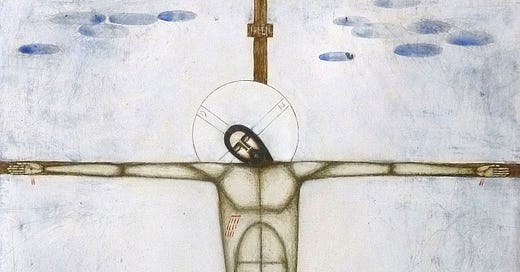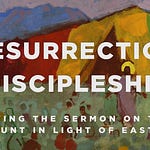“O Lord, who has taught us that to gain the whole world and to lose our souls is great folly, grant us the grace so to lose ourselves that we may truly find ourselves anew in the life of grace, and so to forget ourselves that we may be remembered in your kingdom. Amen.”[i]
Including today, there are just three Sundays between now and Advent. That means there are seven Sundays between now and Christmas. You have been warned. In the Church’s calendar, the first Sunday of Advent begins a new year, which means we are closing out the liturgical year with scripture readings focused on the Lordship of Christ. Our liturgical calendar helps us prepare for Advent and the birth of Christ by recalling how the lordship, kingship, or the reign of Christ differs from what the world tells us we should expect from those we elect or are self-appointed leaders. The irony that the church begins this shift after an election season is not lost on me.
I know that as we explore these texts over the next three Sundays, the temptation is to read our own politics and electoral outcomes into the texts. The elephant and donkey in the room are that when we consider the reign of God and the Lordship of Christ, the politics of our lives inevitably create conflicts of interest, tension, and moments of outright discomfort as we realize that no matter who we vote for, no matter who ultimately wins an election, that person will never, can never, live up to the expectations we place on them and will always fail to deliver on the promises of peace because we know that true and lasting peace can only come from God and through the might of the empire.
Responding to the rise of Adolf Hitler in 1933, Swiss theologian Karl Barth instructed his students to preach as though nothing had happened. Barth implored his students in the German church to remain steadfast and faithful, even as the pressure mounted to compromise its core commitments. Barth’s point is that in the face of a world that feels like it is coming apart at the seams, the church's proclamation remains the same. The temptation is real for the preacher to respond to the soundbites I have heard or articles I have read since Wednesday.
Truth be told, I do not choose our scripture readings for each Sunday. We, like many in the mainline of the church, rely on the Revised Common Lectionary along with the liturgical calendar to order our lives. That means that today’s scripture reading was assigned to this Sunday long before this Sunday was the Sunday after Election Day in America. It will be tempting to read into our scripture readings our politics and desired electoral outcomes.
But let’s name the elephant and the donkey in the room: when we consider the reign of God, the politics of our lives inevitably clash with our hope in Christ. No matter who we vote for or who wins, earthly leaders will inevitably fall short. They can never fulfill the expectations we place on them or deliver on promises of lasting peace because that peace only comes from God. Psalm 146 reminds us, “Do not put your trust in princes, in mortals, in whom there is no help. When their breath departs, they return to the earth; on that very day their plans perish.” Leaders come and go, and their ambitions fade. But the Church’s hope is in the eternal reign of God, not in the plans of mortals.[ii]
Jesus has been critical of the religious and civil authorities throughout his ministry – critical of the temple and executive mansion. He told his disciples, “Whoever wants to be first must be last of all and servant of all.”[iii] Jesus said, “Those whom they recognize as their rulers lord it over them, and their great ones are tyrants over them. But it is not so among you; but whoever wishes to become great among you must be your servant, and whoever wishes to be first among you must be slave of all. For the Son of Man came not to be served but to serve, and to give his life a ransom for many.”[iv]
Jesus’s critique of religious and civil authorities set the stage for his confrontation with the scribes in the temple.
It can be challenging to recognize the people we see every day – neighbors we pass each morning as we walk the dog, the delivery driver who day after day brings boxes to our front porch, the coffeeshop barista, or the person holding a cup and cardboard sign outside of our office. These people can become part of the background of our day. If we are not careful, we can reduce them to scenery in the play of our lives. A friend who serves a church in New York City describes this as the “Manhattan Stare.” Being confronted by depressing sights, navigating the same obstacles on the street, and being overcome by the noise, many learn to walk past people – the people they see every day – without ever seeing them.
As Jesus and his disciples entered the temple, Jesus watched the wealthy and influential people, the scribes, drop large sums of money into the offering plates. As the coins landed with a loud clang, people would turn, taking notice of who was offering such a large gift to the temple. These rich and important people would be greeted with respect because of what they gave and because of their station.
We’re often drawn to leaders who make grand promises, hold power and wealth, and seem capable of changing our lives through might or influence. Yet, Jesus shows us a completely different kind of kingship. His lordship is not about power over others but love poured out for others. As king, Jesus does not demand; he gives. He doesn’t take up a throne but a cross. And it’s there, in his sacrifice, that we see the true nature of his reign.”
As all of this was happening, Jesus took notice of a widow offering two copper coins worth one penny. The two coins hit the offering plate without an attention-grabbing clang. The temple priests overlooked the widow’s offering because it was not substantial enough to cut through the noise of the temple. No one, except Jesus, sees her act of generosity. As a widow, she is vulnerable and invisible to many. And still, despite the injustices around her, this widow gives all she has to God. Her trust and sacrifice stand as a prophetic witness against the wealth and status that demand respect in the temple. And for Jesus, who is unimpressed by acts of those who seek attention for themselves, turns to the widow and honors her act of generosity. In Christ’s eyes, the widow’s gift to the temple that day was most impressive.
Jesus’s focus was not on preserving institutions, religious or civil. His lordship was not about returning to the “glory days” of Israel. The reign of God was not about overthrowing Rome 2000 years ago. No, the Lordship of Jesus Christ is a radical departure, reversal, of the way that so many societies are structured around privilege, wealth, and power. Jesus’s lordship is not about power over others but love poured out for all. As king, Jesus does not demand; he gives. He doesn’t take up a throne but a cross. And it’s there, in his sacrifice, that we see the true nature of his reign.
We can look at what we think we want or need from our leaders, from those we grant temporary authority to organize and lead our community and nation and believe that we need people like those scribes – leaders who can lead by drawing attention to what they have done. We are attracted to the attention-grabbing clang, and it is tempting to revere them in the marketplace because that is what others expect of us or because that is what our leaders have conditioned us to do; their mere presence is a gift. However, Jesus’s willingness to confront the scribes and his lack of respect for those who did not respect the authority they had is clear.
If not for Jesus, we might not have noticed the widow and her generosity. Her love of God is excessive and extravagant. Her two copper coins, Jesus tells us, represent more love and deeper devotion to God than all of the thousands given by the rich.
The widow, you see, is a prelude for us to the self-giving love of God. At this point in Mark’s gospel, Jesus is on his way to the cross. He is on his way to lay down every last cent for us. The generosity of Jesus was self-giving for all and total. Unlike those who give seeking something for themselves, Jesus gave so that salvation, the making of all things new, would touch every corner of creation. Jesus is the most generous of kings because we are wrapped in the fullness of his giving – you, me, the scribes, and most importantly, those we fail to see, those we choose to ignore, and those our leaders willfully ignore or intentionally harm to maintain their status.
As Jesus draws nearer to the cross, he reveals that his kingship is not about amassing power or commanding respect but about surrender, humility, and love that reaches even those we fail to see. In this final stretch toward Advent, may we see with Christ’s eyes, honor the unnoticed gifts around us, and live in response to the boundless generosity God offers to all.
[i] Niebuhr, Reinhold
[ii] Psalm 146:3-4
[iii] Mark 9:35
[iv] Mark 10:42-44

















Share this post